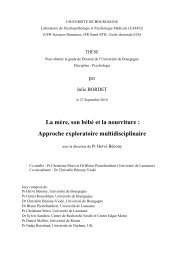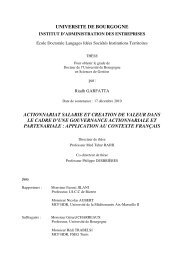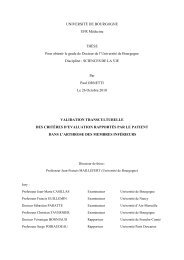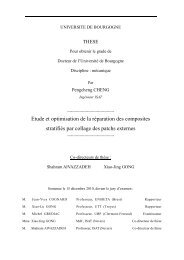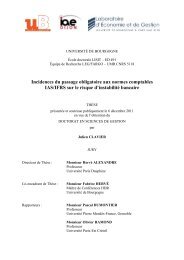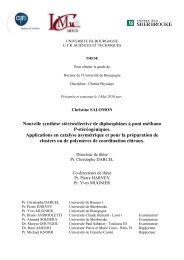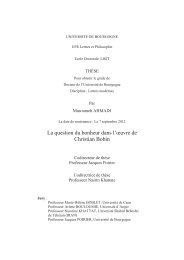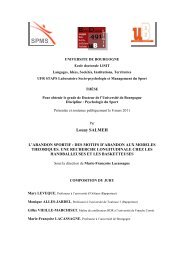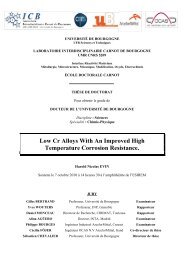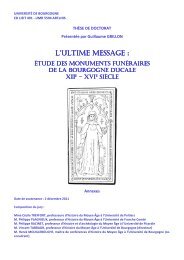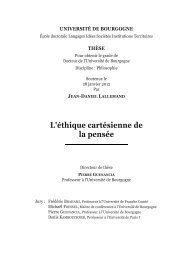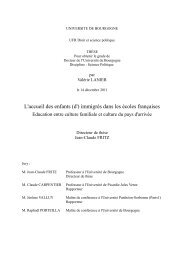Higher education in Asian countries and the role of international ...
Higher education in Asian countries and the role of international ...
Higher education in Asian countries and the role of international ...
Create successful ePaper yourself
Turn your PDF publications into a flip-book with our unique Google optimized e-Paper software.
54<br />
economic development, national need, cultural forces <strong>and</strong> ideologies. In an organization all<br />
members or players or actors are engaged <strong>in</strong> same program but all players do not necessarily<br />
have <strong>the</strong> same choices <strong>and</strong> sometimes members are bound to adopt or play some strategy aga<strong>in</strong>st<br />
its will. In o<strong>the</strong>r words, <strong>in</strong> some cases all, players are not free to make choices. Fur<strong>the</strong>rmore,<br />
unlike a real game, states can enter or leave an IGO or coalition <strong>and</strong> enter <strong>in</strong>to ano<strong>the</strong>r one. In<br />
such a complicated network, which is based on multifaceted cooperation <strong>and</strong> coord<strong>in</strong>ation<br />
among <strong>the</strong> player, it is difficult to see one s<strong>in</strong>gle game <strong>in</strong> isolation. As ma<strong>in</strong>ta<strong>in</strong>ed by realist<br />
school <strong>of</strong> thought that “big powers <strong>in</strong> an IGO” play dom<strong>in</strong>ated strategy, even <strong>in</strong> both<br />
coord<strong>in</strong>ation <strong>and</strong> cooperative games as a result <strong>the</strong> Nash equilibrium is not <strong>in</strong> <strong>the</strong> favor <strong>of</strong> o<strong>the</strong>r<br />
member <strong>countries</strong>. Accord<strong>in</strong>g to this school, as big powers always keep <strong>the</strong>ir pay<strong>of</strong>f or <strong>in</strong>terests<br />
at <strong>the</strong> first place so for o<strong>the</strong>r states <strong>the</strong> pay<strong>of</strong>f are very less as compared to big powers.<br />
In today‟s <strong>in</strong>terl<strong>in</strong>ked world nei<strong>the</strong>r a state nor an organization can survive <strong>in</strong> isolation so both<br />
states <strong>and</strong> organization form or enter <strong>in</strong>to networks. Multiple IGOs <strong>and</strong> State Network is a simple<br />
example <strong>of</strong> such IGO-IGO, State-State <strong>and</strong> IGOs-States <strong>in</strong>teraction <strong>and</strong> collaboration where each<br />
entity is l<strong>in</strong>ked with <strong>the</strong> o<strong>the</strong>r/s. This results <strong>in</strong>to a complex web <strong>of</strong> networks.<br />
3.5.2 Growth <strong>of</strong> IGOs<br />
The growth <strong>of</strong> <strong>in</strong>ternational organizations <strong>and</strong> <strong>the</strong> emergence <strong>of</strong> an <strong>in</strong>ternational public sector<br />
have been nei<strong>the</strong>r predicted by <strong>in</strong>ternational relations <strong>the</strong>ory, nor does much <strong>of</strong> <strong>the</strong> <strong>the</strong>ory<br />
expla<strong>in</strong> how it works. (Haack & Mathiason, 2010) For <strong>the</strong> last few decades <strong>in</strong>ternational<br />
organizations have become a prom<strong>in</strong>ent element <strong>of</strong> <strong>in</strong>ternational politics <strong>and</strong> development. With<br />
<strong>the</strong> passage <strong>of</strong> time IO factor is fur<strong>the</strong>r <strong>in</strong>tensify<strong>in</strong>g, which is also evident from <strong>the</strong> rapid growth<br />
<strong>of</strong> both <strong>in</strong>tergovernmental organizations (IGOs) <strong>and</strong> nongovernmental organizations (NGOs) <strong>and</strong><br />
from enhanced presence <strong>of</strong> IOs <strong>in</strong> our daily life.<br />
3.5.3 Organization as field <strong>of</strong> study<br />
With <strong>the</strong> proliferation <strong>of</strong> organization <strong>in</strong> <strong>the</strong> world a new doma<strong>in</strong> <strong>of</strong> studies <strong>in</strong> <strong>the</strong> social sciences<br />
has emerged. Researcher <strong>and</strong> students from variety <strong>of</strong> discipl<strong>in</strong>es, economics, <strong>in</strong>ternational<br />
relations, management, psychology <strong>and</strong> sociology, are study<strong>in</strong>g different aspects <strong>of</strong> <strong>the</strong><br />
organizations that may <strong>in</strong>clude organizational behavior, structure, communication, function,<br />
classification, analysis, reforms, process <strong>of</strong> transformation, <strong>role</strong>, impact <strong>and</strong> network<strong>in</strong>g. Due to<br />
such a wide scope <strong>of</strong> organizational studies, today <strong>in</strong> <strong>the</strong> social sciences, organizations are<br />
studied by researchers who present an array <strong>of</strong> discipl<strong>in</strong>es; <strong>the</strong> most common <strong>of</strong>, which are



